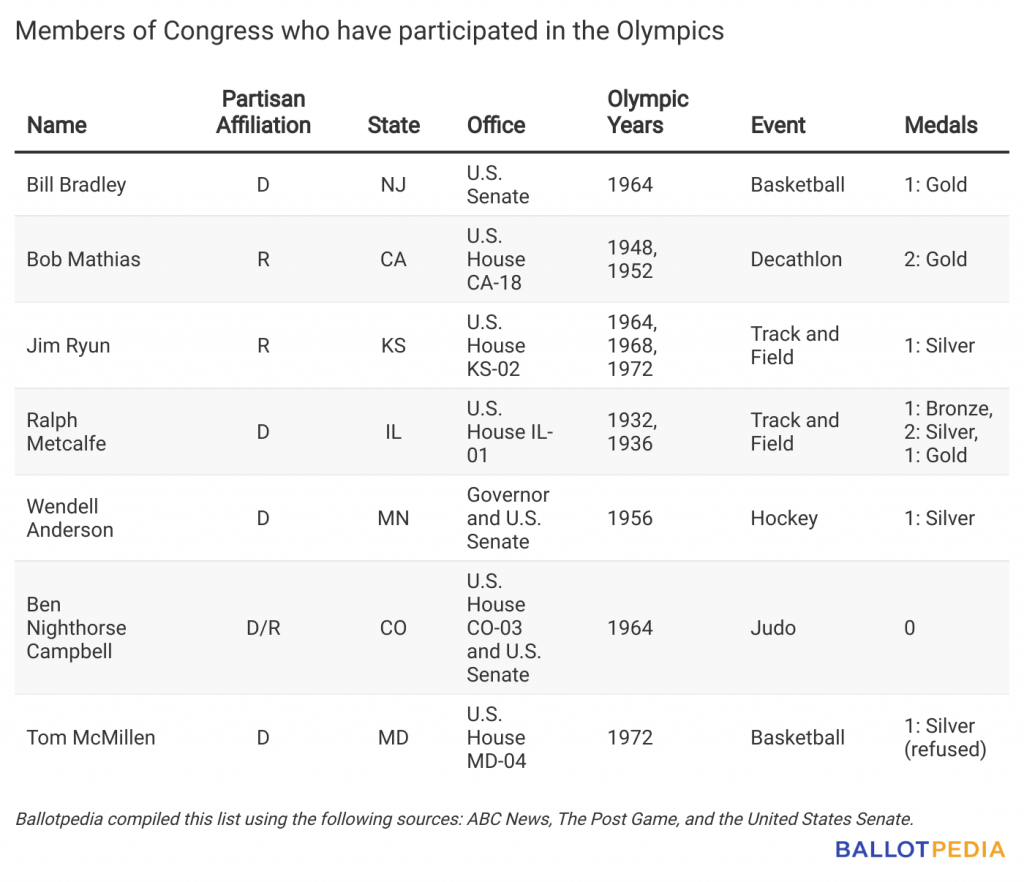Welcome to the Friday, July 23, Brew. Here’s what’s in store for you as you start your day:
- Politics & Olympians
- Group submits signatures for November ballot measure that would increase the minimum wage in Tucson, Arizona
- #Fridaytrivia
Politics & Olympians
Today kicks off the 2020 Tokyo Olympics—held one year later than scheduled due to COVID-19. We thought it would be interesting to bring you an overview of the politicians who have also been Olympians. From time to time, we enjoy looking into the crossover between politics and other areas of interest. For example, we featured a story in February looking at politicians who have run in the Superbowl.
We found examples of at least seven politicians who participated in at least one Olympics before serving as a member of Congress. Of those seven, three won gold medals in their events. Bill Bradley (D) won gold as a member of the Olympic basketball team in the 1964 Olympics before becoming a Democratic U.S. Senator for New Jersey. Bob Mathias (R) won his gold medal in the decathlon in both 1948 and 1952, going on to represent California’s 18th Congressional District. Ralph Metcalfe (D), who later represented Illinois' 1st Congressional District in the U.S. House, won gold in the 4 x 100 meter relay in 1936.
These Olympians-turned-politicians represented seven different states—California, Colorado, Kansas, Maryland, Minnesota, and New Jersey. Two of these Olympians served in the U.S. Senate, four served in the U.S. House, and one (Ben Nighthorse Campbell) served in both the U.S. Senate and House.
The table below contains the full list that we found.

Group submits signatures for November ballot measure that would increase the minimum wage in Tucson, Arizona
On July 2, Tucson Fight for $15, the campaign behind a local minimum wage increase, submitted 29,526 signatures to the city's clerk office.
In Tucson, Arizona, petitioners needed to submit 14,826 valid signatures by July 2 to qualify for the November 2021 ballot. If enough signatures are certified, the measure will go before the city council. The city council will have two options: approve the initiative, precluding an election, or send the initiative to the ballot.
The initiative would amend the city code to incrementally increase the city's minimum wage from $12.15 (the state's minimum wage) to $15 by January 1, 2025, and increase it every January thereafter by the rate of inflation rounded to the nearest multiple of $0.05. The minimum wage would increase by the following increments:
- $13 by April 1, 2022,
- $13.50 by January 1, 2023,
- $14.25 by January 1, 2024, and
- $15.00 by January 1, 2025.
The initiative would also establish a Department of Labor Standards by April 1, 2022. The department would be authorized to receive complaints from employees, investigate employers, and educate workers about their rights under the initiative. A violation of the initiative would be a civil infraction with a civil penalty of up to $100 per employee affected by the violation paid to the city. If multiple violations occur, the city may revoke, suspend, or decline to renew any licenses of the employer.
In 2016, Arizona passed Proposition 206, which increased the minimum wage to $10 in 2017, and then incrementally to $12 by 2020, and created a right to paid sick time off from employment. It was approved by a margin of 58.33% to 41.67%.
Since 2016, Ballotpedia has tracked 18 local minimum wage ballot measures, including the 2021 measure in Tucson.
The average state minimum wage in 2021 is about $9.59, up from $9.17 in 2020. The highest statewide minimum wages are
- $14.00 in California,
- $13.69 in Washington, and
- $13.50 in Massachusetts.
#Fridaytrivia
On Tuesday, I wrote about the federal judicial vacancies, nominations, and confirmations six months into Biden’s presidency. So for today’s quiz, we’re asking:
How many judicial vacancies did Biden inherit at the start of his term?


